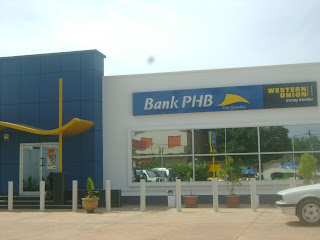CBG Claims Bank PHB (Gambia) Ltd Is On Sound Footing
 |
| Bank PHB (Gambia) Limited |
Sooner had the Nigerian-owned Platinum Habib Bank (Bank PHB) taken over by Keystone Bank Nigeria Limited on August 6, 2011 than the Central Bank of The Gambia (CBG) announced the change would have no bearing on the operations of its subsidiary in Banjul.
Bank PHB Nigeria Limited and two others (Afribank and Spring Bank) in Nigeria had their licenses seized, nationalized and taken over by the Central Bank of Nigeria (CBN) a fortnight ago, after it ruled that they were unable to raise the new capital requirement.
“Bank PHB (Gambia) Limited is a locally incorporated entity and as such the change of ownership would have no bearing on its operations,” the CBG said in an August 8 statement, but fall short of telling the Gambian public the reason behind the takeover.
It adds: “Bank PHB (Gambia) Ltd is profitable, highly liquid and well capitalized. As at end-June 2011 the capital of the Bank total D200 million, higher than the minimum capital requirement of D150 million. In essence, Bank PHB is in good financial health to meet its obligations to depositors and lender–creditors as they arise.”
Within the shortest possible time, ownership of the three banks was passed to the state-run Asset Management Corporation of Nigeria (AMCON), which seeks to raise the funds for the banks through bond issues. A sum of 679 billion naira ($4.5billion) is to been injected into the three banks by the Nigerian Government.
With growing uncertainty surrounding the financial market, AMCON assured depositors that their monies are safe and employees are also assured of seamless continuity of business operations and job functions.
In the Gambia, the CBG equally assured the public of seamless business continuity and the ability of Bank PHB (Gambia) Ltd to discharge its responsibilities in a safe and sound manner.
“AMCON said N285 billion would be given to Mainstreet Bank (formerly Afribank), N283 billion to Keystone Bank (formerly Bank PHB Plc) and N110 billion to Enterprise Bank (formerly Spring Bank) to raise their capital adequacy ratio to 15 percent as well as to enable them to pay back the funds that the CBN injected into them in 2009,” local media reports said on Monday.
Following the revocation of their licences, the Nigerian government through the Nigeria Deposit Insurance Corporation (NDIC), announced it had taken over the three banks by incorporating what it called “Bridge Banks” to temporarily take control of the three banks.
The government created three bridge banks: Mainstreet Bank, Keystone Bank, and Enterprise Bank, to take over the assets and liabilities of the banks in the interim.
“A bridge bank is a temporary bank established and operated by financial regulators to acquire the assets and liabilities of a failed bank to facilitate its resolution,” The Voice newspaper understands.
 |
| Governor of Central Bank of Nigeria, Lamido Sanusi |
Bank PHB, Afribank and Spring Bank and six other banks in Nigeria had $4billion injected into them by the Central Bank of Nigerian (CBN) in 2009, however, the three banks failed to meet the CNB’s capital requirement, a time limit for which is September 30, 2011.
Despite the deadline still more than a month to come, the Nigerian authorities believe it was very obvious the affected banks were having difficulties pulling through the re-capitilaistion process, saying the move is in line with Federal government's commitment not to allow any bank to “go under”.
The three banks were among the 10 that failed the CBN stress test conducted in June 2009, a manifestation that they would have struggled to withstand another financial crisis.
Bank PHB was formed in 2005 by the merger between Platinum Bank Plc and Habib Nigeria Bank Plc. Since its inception, the bank has pursued a strategy of expansion by the acquisition and creation of subsidiaries in and outside its home country of Nigeria.
The subsidiary of the Nigerian-owned bank, one among 14 commercial banks, opened for operation in The Gambia in 2007.
At present, thirteen banks operates in a relatively ‘small market’ in the Gambia, after the 14th (a subsidiary of the Nigerian-owned Oceanic Bank) was forced to close down in January 2011 after it failed to meet the CBG’s minimum capital requirement of D150 million on December 31, 2010.
Meanwhile Spring Bank and Afribank have been taken over by Enterprise Bank Limited and Mainstream Bank Limited, respectively.
· Author: Modou S. Joof, for The Voice Newspaper
It's genuinely very complex in this active life to listen news on Television, therefore I simply use internet for that purpose, and get the hottest news.
ReplyDeleteAlso visit my web page - http://wiki.dota2-fans.de/